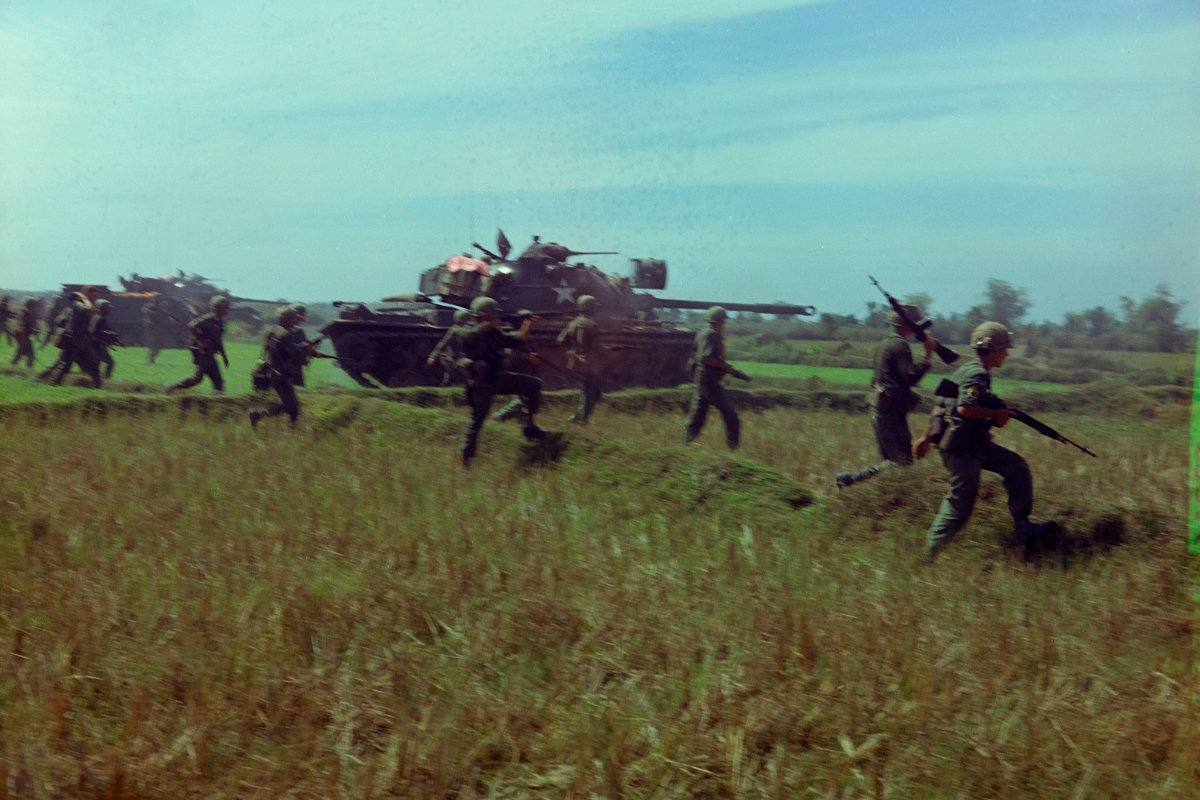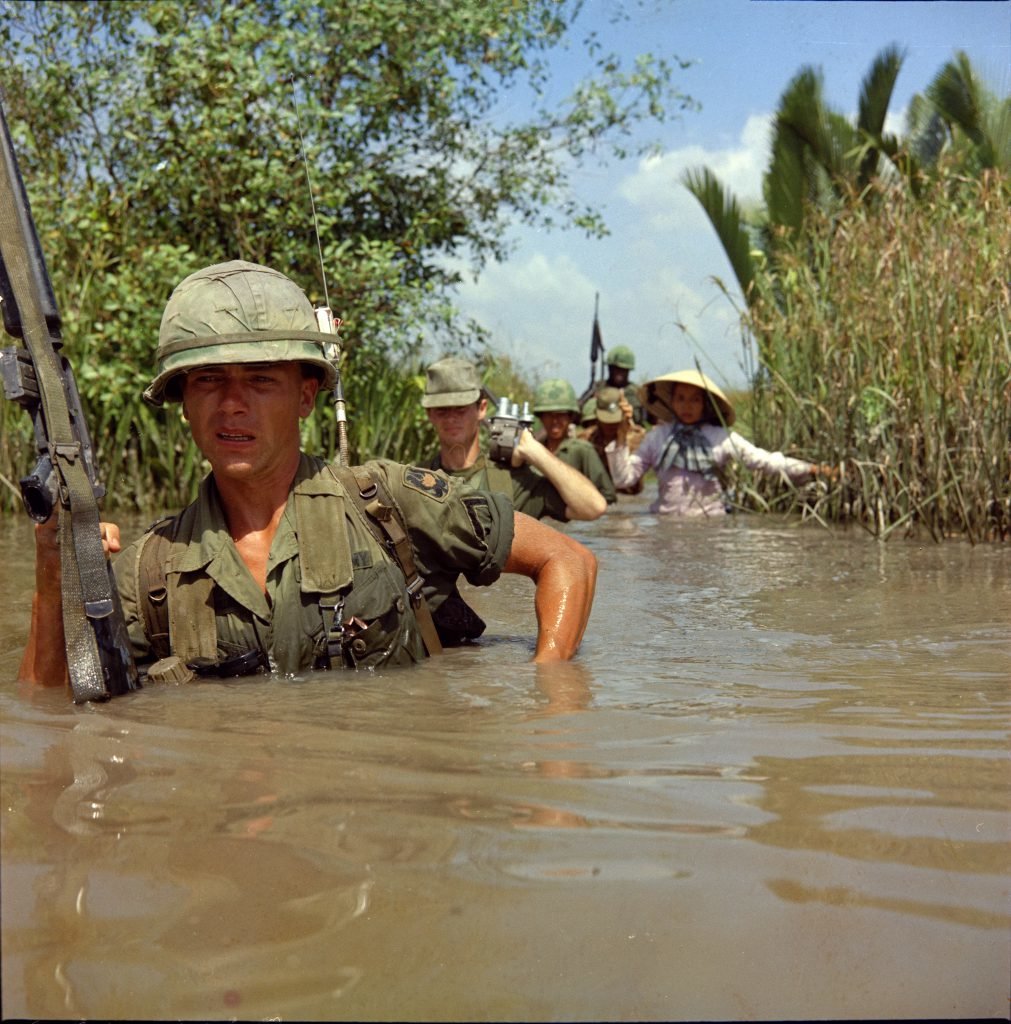The Vietnam War and Media: How Television Played a Vital Role in the War

US soldiers searching for Viet Cong near Laikhe, 1/8/1966. (National Archives Identifier 66956820)
When the citizens of Saigon prepared for their Lunar New Year — also known as Tet — on Jan. 30, 1968, they cleaned their houses and boiled their celebratory rice cakes. Even as the war ravaged their resources and rival forces in the North had stolen their families and friends, they’d always have their holiday.
Tet was typically a time of peace, and the prevailing notion was that it would be celebrated in 1968 just like it had been the years before: with a ceasefire that proved to be a quiet break before further progress on the warfront. What they didn’t know was that a major attack by North Vietnam and the Viet Cong was a few hours away. The violence that ensued would end up being the biggest escalation of the war and would become known as the Tet Offensive. It was important for a few reasons, but more than anything it proved to be a turning point for what had been a long and arduous war, especially for American troops in the area. Beyond having to deal with a new form of warfare, the American government had slowly accumulated an unaccounted-for obstacle: their own public.
With Vietnam labeled as the “First Television War” and “the living-room war,” it is without a doubt that the media played a crucial part in shaping the public’s perception of the war and the troops overseas. One of the main factors being the extent to which the media featured imagery from the war — it was more widespread than ever before.
As the nuclear family and white picket fences became the ideal across the US in the 1950s, television sets became a central piece of furniture for those perfectly crafted families of the ’60s. With radios slowly fading out of favor, the trend grew exponentially. By the end of the decade, 93% of Americans owned a television. More importantly, technological strides in audio and video equipment had not only crafted better-quality viewing devices, but also more compact cameras and microphones. This allowed for easier portability and quicker transfers of data, making them ideal to record on-site footage in Vietnam and quickly process that footage in Tokyo.
These advancements meant average citizens were able to get a glimpse of what life actually looked like for troops overseas, and the more they saw, the more they empathized with the gravity of the situation. However, news coverage of the war had always attempted to reinforce support by positively reporting the war. War propaganda always seemed to justify President Lyndon B. Johnson’s agenda; however, the Tet Offensive marked a turning point in news coverage and the media’s descent into showing the negative aspects of the war.

The Tet Offensive was not necessarily a loss for US troops — on the contrary, they managed to quash the offensive, but not without grave casualties to both sides and footage too bloody to air in-between episodes of The Perry Como Show and The Flintstones. The American opinion of and support for the war changed drastically after witnessing its full effect.
The Tet Offensive was a major factor in piquing the American public’s already mounting anti-war sentiments. Until 1968, the war was reported on with the utmost vigor, networks often editing bloody footage to craft and maintain the country’s high morale. The Tet Offensive proved detrimental to the country’s faith in their government and troops, especially because just a few months earlier Johnson had preened for cameras in a massive media blitz to express one decisive message: the war would soon come to a successful end.
But this illusion was no longer so easy to uphold, and with networks growing tired of the president’s pseudo-censorship tactics, the tragic aftermath of the Tet Offensive could and would be splayed across every black-and-white television in America.
Johnson often called networks to air his grievances about the war’s reporting in an effort to instill fear and coerce networks into reporting the war positively. According to CBS correspondent Morley Safer’s autobiography, Flashbacks: On Returning to Vietnam, after he had reported on Cam Ne, a small village burned by US Marine Corps forces without a justified need, the president had asked an executive, “Are you trying to fuck me?”
The media war was two-fold: It painted the soldiers as ruthless and revealed their diminishing position overseas. If anything was obvious, it was that journalists who made the trip to Vietnam were growing increasingly weary of America’s participation.
Walter Cronkite, affectionately nicknamed Uncle Walter due to the trust he garnered with his American viewing audience, was well known for his place at the desk on the CBS Evening News. He was also known for his objective reporting and made it his mission to visit Vietnam after the Tet Offensive. Upon his return, CBS News launched a special about his visit, Vietnam: Who, What, When, Where, and Why? True to its name, the special covered the cornerstones of journalism with footage of Cronkite reporting from the ruins of Saigon.
The end of the segment showed Cronkite back at his desk in New York, where he wrapped up with a statement he openly acknowledges as subjective: “[I]t seems now more certain than ever that the bloody experience of Vietnam is to end in a stalemate […] it is increasingly clear to this reporter that the only rational way out then will be to negotiate, not as victors, but as an honorable people who lived up to their pledge to defend democracy, and did the best they could.”
This has become embalmed in our memories as the Cronkite moment, and it’s said that it served as a moment of enlightenment for the president, who then made steady efforts to end the war.
While the media was inevitably involved in the outcome of Vietnam, Americans had several causes for their disenchantment. More than anything, everyone knew someone who didn’t come home, often leading to a debate of whether the news was reflective of the public opinion or the cause of it.

BRCC and Bad Moon Print Press team up for an exclusive, limited-edition T-shirt design!
BRCC partners with Team Room Design for an exclusive T-shirt release!
Thirty Seconds Out has partnered with BRCC for an exclusive shirt design invoking the God of Winter.
Lucas O'Hara of Grizzly Forge has teamed up with BRCC for a badass, exclusive Shirt Club T-shirt design featuring his most popular knife and tiomahawk.
Coffee or Die sits down with one of the graphic designers behind Black Rifle Coffee's signature look and vibe.
Biden will award the Medal of Honor to a Vietnam War Army helicopter pilot who risked his life to save a reconnaissance team from almost certain death.
Ever wonder how much Jack Mandaville would f*ck sh*t up if he went back in time? The American Revolution didn't even see him coming.
A nearly 200-year-old West Point time capsule that at first appeared to yield little more than dust contains hidden treasure, the US Military Academy said.












